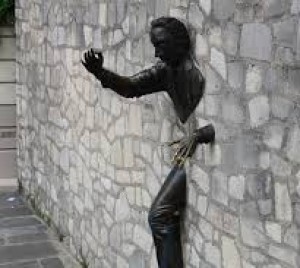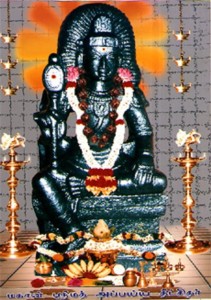The fear most commonly experienced is the thought that I will end with the death of my physical body. Such a thought equating the ending of the “I” with the ending of the gross body indicates clearly the persisting misidentification of “I” with the body. It is the separate self which feels that it will disappear with the disappearance of the body. The cure for it is the recognition of the fact that the true “I” that I am, as Advaita teaches, is neither born nor will die; “I” is eternal, ageless, and imperishable (Bhagavad-Gita II-20). One who has really understood the Advaitic message abides as the true “I.” ‘To abide as the true I’ means to be knowingly as that immortal and changeless Awareness and not to mistake oneself to be the body and the mind which are transient and perishable. Therefore, disciplining the body through a drill of practices (as done in skill development like car-driving or carpentry) or control of the mind through repeat exercises (as required for computer coding or mathematics) can hardly be called abidance as the true “I.” Conscientiously feeling the difference between the phrases ‘I am the body’ and ‘I am aware of the body’ and experientially realizing that difference will help to firm up the understanding.
Tag Archives: jivanmukta
Fear from wild creatures – 2
Fear can be caused by a perceived threat which could be either from within the body-mind or from a source external to the body. The source of fear itself and consequently the type of fear can be either real or imaginary. We shall, however, not consider the issues related to the nature of the source causing the fear in this essay. We shall treat fear as a ‘signaling mechanism.’ Viewed thus, ‘fear’ includes all its other manifestations and variations like anger, hatred, disgust, anxiety, revenge etc. The signal itself appears as tightening of muscles, fastness of breath, heaviness in the heart area, slowness of digestive processes, dilation of pupils of the eye, contortion in the facial muscles, perspiration and so on. Depending on the intensity of the threat, the flux of thoughts may alter and even the sense of a ‘separate self’ may disappear.
A point to be remembered is that, though all such reactions are commonly attributed to the source, the perceived source itself is not the cause. It is in the way one’s body-mind are programmed to react. Suppose you sweat on mistakenly seeing a rope as a snake in semi-darkness. The unreal snake in the rope has actually nothing to do with the way your body has reacted. Continue reading
Fear from wild creatures – 1
 “I understand the Advaita teaching that everything is One only without a second, but I am always afraid of dogs and monkeys which are common in my place. Moreover, I also have a fear of snakes etc. as I live in a forest area.
“I understand the Advaita teaching that everything is One only without a second, but I am always afraid of dogs and monkeys which are common in my place. Moreover, I also have a fear of snakes etc. as I live in a forest area.
Everything is brahman and therefore, ‘fear’ is also brahman. Though my mind is convinced by the logic of Advaita, why do I suffer from various fears?”
If there is a perception of fear, it automatically implies that there is a ‘me’ as the ‘subject,’ the finite perceiver and there is the ‘other,’ an object, separated from ‘me.’ (For this analysis, we define an ‘object’ as anything that is perceived. Hence ‘fear’ is also an object). This in turn implies that I ignored my ‘Dimensionlessness’ (anantatva) and assumed finiteness to myself.
It is true that on the full understanding of the Oneness of “Whatever-That-IS,” there is no scope for any sort of ‘fear.’ After all, if all is One, and there is no second, where and who is the other to be afraid of?
We have a recent real-life example for this in the 35th Pontiff of Sringeri, Shri Abhinava Vidyatheertha Swami. He found a big cobra snake coiled around his neck when he was meditating in a remote forest area. He told his Successor: Continue reading
Living In The Moment Eternally – 2
[Nobody has obviously noticed or pointed out that the continuation articles have not been posted for two years! So I am proceeding with the Series of articles here a bit hesitantly as I am not sure of the Reader-interest. In these two years my computer lost the “memory” of my notes and files stored on the subject (thanks to the hackers from Nigeria). I am hence obliged to go by whatever material I could harness in the ‘now’ from my computer. Part – 1 here. Part – 3 here . ]
The main question of interest for us here is “How does the body of a Self-realized man live eternally in the ‘Now’ and function in the day to day life of eating, moving, acting and interacting in the absence of ‘memory’ of past experience/knowledge for recognition? What does “Now” mean for him/her? Is the “Now” on a temporal dimension?”
Whether we are consciously aware of it or not, it is impossible to lead a normal life in the world without memory. Maybe it is simply responding to when your name is called or you have to find a solution to a much more complicated problem of technology, memory plays a significant role. Therefore, before we venture to answer the questions on the functioning of a jIvanmukta‘s body, one could be curious to know about the lives of those who are at a disadvantage in their worldly life because they do not have an access to their memory anymore . I shall list briefly a few such cases which are well studied by scientists. Their lives may look yet times hilarious and often poignant and heartbreaking but always harrowing to their care givers. Continue reading
Continue reading
Knowledge and the Fruit of Knowledge
 Following on from the l-o-n-g discussion we had on this topic under the thread ‘akhaNDAkAra vRRitti – The End of Suffering‘, I have written what was intended to be the commentary on kArikA 3.40 in my next book (OM: Waking Dreams… and Reality), which covers the essence of this discussion. I have decided that I will probably simplify this considerably for the book, because it is intended to be an accessible and readable book, rather than an academic one. But, because of its relevance, I am posting the entire section, as first written, below.
Following on from the l-o-n-g discussion we had on this topic under the thread ‘akhaNDAkAra vRRitti – The End of Suffering‘, I have written what was intended to be the commentary on kArikA 3.40 in my next book (OM: Waking Dreams… and Reality), which covers the essence of this discussion. I have decided that I will probably simplify this considerably for the book, because it is intended to be an accessible and readable book, rather than an academic one. But, because of its relevance, I am posting the entire section, as first written, below.
You now know all about adhyAropa and apavAda and acknowledge that all of the teaching is only interim, to be used to lead us to the final understanding and then discarded. The corollary to this is that, in principle at least, any teaching could be used for this purpose. If it works, it is valid. So it is hardly surprising that there are other methodologies altogether, which can have the same ultimate purport, e.g. Zen Buddhism, Taoism, Kabbalah etc. (I don’t have any personal knowledge of these other systems but understand that their essential teaching is non-dual.)
As far as Advaita Vedanta is concerned, the finer details of the teaching differed from one teacher or branch to another, both before and after Shankara. And some modern-day proponents tend to adhere to some elements and some to others that are apparently contradictory. None of this matters in the final analysis but does tend to lead to some quite heated discussions on the Internet! Continue reading
Living In The Moment Eternally – 1
We, the traditional Advaitins, are a prejudicial lot – aren’t we? Appayya Dikshitar’s words uttered in delirium when his brain was under the influence of the hallucinogenic Datura seeds are for us a beautiful AtmArpaNastuti in praise of Lord Shiva. But the mutterings of some other ordinary mortal with a differently affected brain is mere meaningless chatter unworthy of any notice. Let us not forget that both are actions done under conditions of an altered brain. And in both cases, an external agency is responsible for causing the change in the brain.
It was UG who famously said once that whether it was Beethoven’s 9th Symphony or pulling the chain in the WC sounded the same to him. Some of the Zen Masters used to respond to the simple questions like “What is the time now?” with an answer that the mountain was running or some such response – totally frivolous and meaningless on the face of it. But their effort was to draw our attention to the way our mind functions in assigning ‘meaning and significance’ (which are actually not there) ever caught up in a habituated pattern which we normally fail to detect.
Over six years ago, I prepared a comparative statement of the characteristics of an ordinary person and a ‘Self-realized’ man. I used the information collated from many sources that I could lay my hands on in preparing this tabulated compilation — almost like what a Purchase Officer does with the quotations (s)he obtains. There were several reasons behind this exercise of mine. Continue reading
What is the point of enlightenment? – Q.339
Q: I have seen from articles and questions on your website that Brahman cannot ‘know’ or ‘do’ anything; that it (as if) acts and knows only through the body-mind of the jIva. What I would like to know is: why would anyone want to become enlightened if this means the end of rebirth, and ‘becoming’ one with Brahman? OK, this may mean the end of suffering but does it not also mean the end of enjoyment? If ‘I’ (even though this is only a reflection in the mind) cease to exist (when the body-mind finally ceases to exist) on the death of the enlightened person, then there is no more experiencing of any kind for me as that person, and none for the Brahman that I (as it were) become.
You will perhaps say that, as Brahman, I will still experience through all the other body-minds but this does not sound like enlightenment to me! And don’t I do that already anyway since there is only Brahman? In which case what is the meaning (and point) of enlightenment? Continue reading
An Assortment of Short Questions
Here are a few short questions, with answers from Dennis, from the as-yet-unpublished backlog:
Q: I am a student of James Swartz. I was wanting to find a good reference book for learning the terminology of Vedanta in Sanskrit. James recommended I contact you to ask which one of your books would the most helpful. If you have time to point me in the right direction it would be much appreciated. Thank you.
A: That’s an easy one! The best book by far (of which I am aware) is John Grimes’ book. See first entry on http://www.advaita.org.uk/library/i_indian.html (and if you click through to Amazon to buy, you will earn me a small commission!)
*****
Q: I am confused about what you mean (in the book ‘Enlightenment: The Path Through the Jungle’) by teachers who teach by Satsang. I understood Satsang to mean an occasion to gather round a master to imbue his teachings and darshan and that this has been a time honored traditional practice of Saints and Gurus in India. Continue reading



